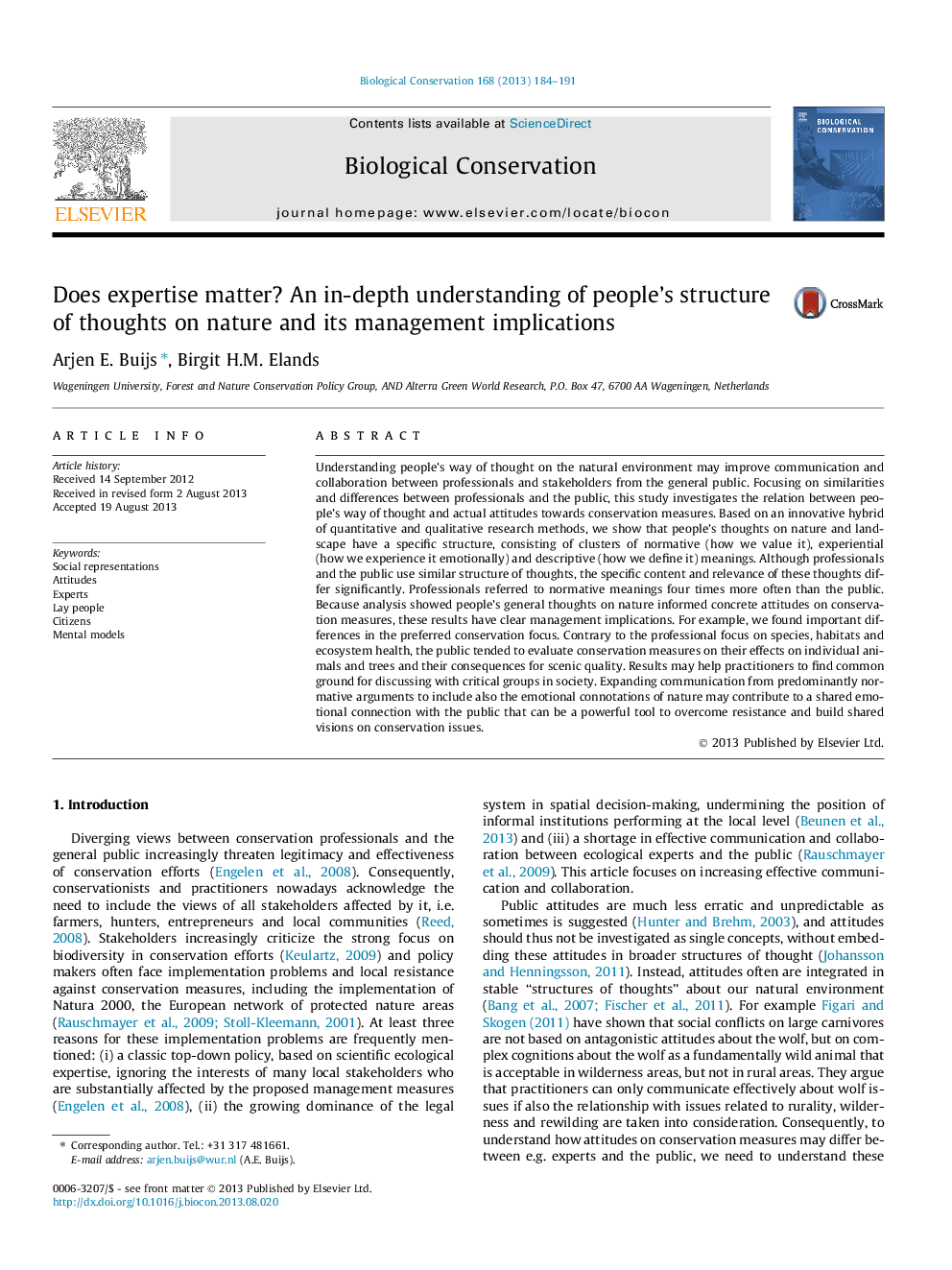| کد مقاله | کد نشریه | سال انتشار | مقاله انگلیسی | نسخه تمام متن |
|---|---|---|---|---|
| 6300359 | 1617933 | 2013 | 8 صفحه PDF | دانلود رایگان |
عنوان انگلیسی مقاله ISI
Does expertise matter? An in-depth understanding of people's structure of thoughts on nature and its management implications
ترجمه فارسی عنوان
آیا تخصص مهم است؟ درک عمیق ساختار افکار عمومی درباره طبیعت و پیامدهای مدیریت آن
دانلود مقاله + سفارش ترجمه
دانلود مقاله ISI انگلیسی
رایگان برای ایرانیان
کلمات کلیدی
نمایندگی های اجتماعی، نگرش های، کارشناسان، وضع مردم، شهروندان مدل های ذهنی،
ترجمه چکیده
شناخت راه های فکر مردم در محیط طبیعی می تواند ارتباطات و همکاری بین متخصصان و ذینفعان عمومی را بهبود بخشد. در این مقاله با تمرکز بر شباهت ها و تفاوت های بین حرفه ای ها و مردم، رابطه بین شیوه تفکر مردم و نگرش های واقعی نسبت به اقدامات حفاظتی بررسی شده است. بر اساس یک ترکیبی نوآورانه از روشهای کمی و کیفی تحقیق، ما نشان می دهد که افکار مردم در مورد طبیعت و چشم انداز دارای یک ساختار خاص است، که شامل خوشه های هنجاری (چگونه ما آن را ارزشمند)، تجربی (چگونه ما آن را احساس عاطفی) و توصیفی (چگونه ما آن را تعریف می کنیم) معانی. اگر چه متخصصان و عموم مردم از ساختار افکار مشابهی استفاده می کنند، محتوای خاص و ارتباط این افکار به طور قابل توجهی متفاوت است. حرفه ای ها چهار برابر بیشتر از عموم به معانی هنجاری اشاره دارند. از آنجایی که تجزیه و تحلیل نشان داد که افکار عمومی مردم درباره طبیعت، نگرش های بنیادین در مورد اقدامات حفاظتی را آگاه می کند، این نتایج پیامدهای مدیریتی روشن دارد. به عنوان مثال، ما تفاوت های مهم در تمرکز حفاظت ترجیح یافتیم. برخلاف تمرکز حرفه ای بر گونه ها، زیستگاه ها و سلامت اکوسیستم، عموم مردم تمایل به ارزیابی اقدامات حفاظت در برابر اثرات آنها را بر روی حیوانات و درختان فردی و پیامدهای آن برای کیفیت منظره داشتند. نتایج ممکن است به تمرینکنندگان کمک کند تا زمینه مشترک را برای بحث در مورد گروههای بحرانی در جامعه پیدا کنند. گسترش ارتباطات از استدلال های عمدتا هنجاری که شامل ترکیبات عاطفی طبیعت نیز می شود، می تواند به یک ارتباط عاطفی مشترک با مردم کمک کند که می تواند ابزار قدرتمند برای غلبه بر مقاومت و ایجاد دیدگاه های مشترک در مورد مسائل مربوط به حفاظت باشد.
موضوعات مرتبط
علوم زیستی و بیوفناوری
علوم کشاورزی و بیولوژیک
بوم شناسی، تکامل، رفتار و سامانه شناسی
چکیده انگلیسی
Understanding people's way of thought on the natural environment may improve communication and collaboration between professionals and stakeholders from the general public. Focusing on similarities and differences between professionals and the public, this study investigates the relation between people's way of thought and actual attitudes towards conservation measures. Based on an innovative hybrid of quantitative and qualitative research methods, we show that people's thoughts on nature and landscape have a specific structure, consisting of clusters of normative (how we value it), experiential (how we experience it emotionally) and descriptive (how we define it) meanings. Although professionals and the public use similar structure of thoughts, the specific content and relevance of these thoughts differ significantly. Professionals referred to normative meanings four times more often than the public. Because analysis showed people's general thoughts on nature informed concrete attitudes on conservation measures, these results have clear management implications. For example, we found important differences in the preferred conservation focus. Contrary to the professional focus on species, habitats and ecosystem health, the public tended to evaluate conservation measures on their effects on individual animals and trees and their consequences for scenic quality. Results may help practitioners to find common ground for discussing with critical groups in society. Expanding communication from predominantly normative arguments to include also the emotional connotations of nature may contribute to a shared emotional connection with the public that can be a powerful tool to overcome resistance and build shared visions on conservation issues.
ناشر
Database: Elsevier - ScienceDirect (ساینس دایرکت)
Journal: Biological Conservation - Volume 168, December 2013, Pages 184-191
Journal: Biological Conservation - Volume 168, December 2013, Pages 184-191
نویسندگان
Arjen E. Buijs, Birgit H.M. Elands,
